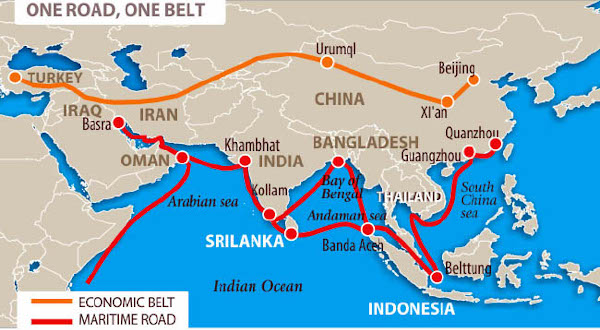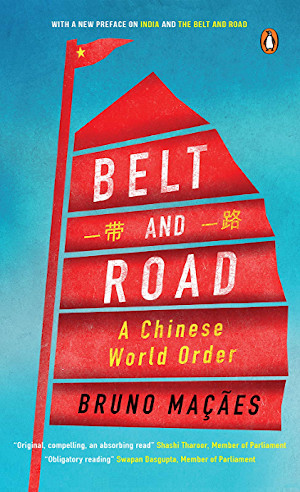Book Review: Belt and Road - A Chinese World Order by Bruno Maçães

Manickavasagam, or Vasagam for short, graduated as a civil engineer in 1964. He joined the Indian Army in 1965 and became a 'Fauji'. During his career with the armed forces, he served in Leh, Ladakh and Poona (now Pune).
Vasagam joined Indian Revenue Service (Customs and Central Service) in November 1971. Switching over from olive green to civvies was difficult initially but time was a healer. Upon superannuation, he joined the Central Administrative Tribunal and served for the 5 years and 9 months as Administrative Member.
Vasagam is a prolific writer and has already penned three novels in Tamil and hopes to finish the fourth essay within a year. He headed a team which produced a CD-ROM on the life and teachings of Adi Sankara.
These days, Vasagam is leading a retired life with his spouse. His elder son is a computer engineer who lives in America while the younger one is based in Bengaluru. Vasgam is blessed with two grandchildren.
Introductory Note by Editor
Initially announced in 2013 with a purpose of restoring the ancient Silk Route that connected Asia and Europe, the scope of the ‘One Belt One Road’ (OBOR) project has been expanded over the years to include new territories and development initiatives. Also called the ‘Belt and Road Initiative’ (BRI), the project involves building a big network of roadways, railways, maritime ports, power grids, oil and gas pipelines, and associated infrastructure projects.
The OBOR project covers two parts. The first is called the “Silk Road Economic Belt,” which is primarily land-based and is expected to connect China with Central Asia, Eastern Europe, and Western Europe. The second is called the “21st Century Maritime Silk Road,” which is sea-based and is expected to will China’s southern coast to the Mediterranean, Africa, South-East Asia, and Central Asia. The names are confusing as the ‘Belt’ is actually a network of roads, and the ‘Road’ is a sea route.

Map showing the One Belt One Road project.
This week's issue of The Economist has a special report on China’s Belt and Road Initiative.
About the book

Title: Belt and Road: A Chinese World Order
Author: Bruno Maçães
Publisher: Penguin India
Publication: 2019
Language: English
ISBN-13: 978-0670092307
Pages: 208 (Hardback)
Price: Rs. 599
Website: https://penguin.co.in/book/uncategorized/belt-and-road/
Description
China's Belt and Road strategy is acknowledged to be the most ambitious geopolitical initiative of the age. Covering almost seventy countries by land and sea, it will affect every element of global society, from shipping to agriculture, digital economy to tourism, politics to culture. Most importantly, it symbolizes a new phase in China's ambitions as a superpower: to remake the world economy and crown Beijing as the new center of capitalism and globalization.
Bruno Maçães traces this extraordinary initiative's history, highlighting its achievements to date, and its staggering complexity. He asks whether Belt and Road is about more than power projection and profit. Might it herald a new set of universal political values, to rival those of the West? Is it, in fact, the story of the century?
Author

Bruno Maçães is a 46 year old Portuguese politician, political scientist, business strategist, and author. He studied at the University of Lisbon and Harvard University, where he wrote his doctoral dissertation under Harvey Mansfield.
Bruno is currently a non-resident senior fellow at Hudson Institute, a senior advisor at Flint Global and a senior fellow at Renmin University, China. Formerly Portugal's Europe minister (2013-15), he has been a regular commentator for CNN, BBC and Al Jazeera, and has written for the Financial Times, The Guardian and Foreign Affairs. His last book was The Dawn of Eurasia: On the Trail of the New World Order. He lives in Beijing, China.
Book Review
‘One Belt One Road’ (OBOR) is the first transnational industrial policy project as against the usual National industrial policy initiatives.
World leaders have huge reservations about the project even though the initiative is likely to many countries and several aspects of lives globally. Some of the opinions of world leaders are: Trump, US Prez says “insulting“. Tillerson, former US Secretary of State says “short term gains and long term dependency“. French Prez Macron says “by definition these roads can only be shared. If they are roads, they cannot be one way. After all the Silk Roads were never only Chinese“.
India is opposed to this initiative right from the beginning for a variety of reasons. India objects to OBOR or BRI due to concerns about territorial sovereignty. China has pumped in billions of dollars in countries in and around India to ensure support for China in future times.
Ambassadors of 27 countries in EU said that China wanted to shape globalization to suit its own interests. Germany has decided not to sell a key industry to China. Leifeld Metal spinning AG- specialized in rocket and nuclear technology.
Australia, NZ, and Japan have opposed the project from the very beginning. Some countries like Malaysia canceled earlier commitments.
Yet the project is attracting lot of interest as well as financial commitments.
The book is well researched and contains a lot of data. For example, China imports 160 billion US dollars worth agricultural products a year. And under the new trade agreement if signed that’s likely to go much higher.
China’s gross debt exploded from 171% to 299% of the GDP. Yet China straddles the world stage like a giant and is serious competition to both America and Russia.
It almost looks like China is attempting to do now what Britain did in 17th century: naked aggression through economic imposition. China has huge steel and fertilizer stocks and manufacturing capacity. These will have to be dumped some place to China‘s advantage.
On the whole, I recommend that readers pick up the book and read it to learn the global political, economic, and societal problems triggered by the OBOR initiative.
Comments
My view
It's indeed important to read such literature as they widen our understanding about global economy, political strategies and accordingly spread our economic strategies. As a whole the book seems to have been written after good amount of research and not biased.
Add new comment